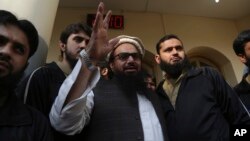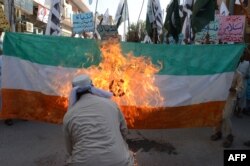Pakistani authorities are announcing a new program aimed at preventing billions of dollars in public donations to charities from ending up with banned militant groups.
The "Safer Charity" initiative announced Tuesday urges people to use caution and donate to responsible humanitarian organizations. The move comes amid concerns that some militant organizations are using front organizations to collect money for allegedly humanitarian work.
According to government officials, people in Pakistan donate up to $4.5 billion annually to help the poor and needy, as part of fulfilling the religious obligation of almsgiving, or zakat.
"Pakistani citizens pay annually an estimated amount of 500 billion rupees [$4.5 billion] in charity and only a portion of that amount is being audited," Ibn Hayyan, a federal official in charge of Safer Charity in Khyber Pakhtunkhwa province, told VOA.
The new program urges citizens to ensure the groups they are donating to have not been banned by the government.
"The charity money should reach needy and less fortunate people, not to those who are engaged to destroy the humanity," Noor Alam Khan, a local politician and former member of the National Assembly of Pakistan, told VOA.
"There is a law that prevents people from giving charity to illegal militant groups, but it has not been put into practice," Khan added.
Earlier this week, Pakistan amended its anti-terrorism law that authorizes the government to blacklist charities linked to Islamist leader Hafiz Saeed. Saeed has been wanted by the United States since 2012 for his role in planning the 2008 Mumbai terror attack.
According to Islam, Muslims are required to pay 2.5 percent of their savings to charity annually.
Banned groups
The recent measure follows last month's announcement by the country's Ministry of Interior that it had blacklisted 72 charitable organizations suspected of involvement in militancy, barring them from fundraising in the country.
The list includes Hafiz Saeed's Jamaat-ud-Dawa (JuD) and its subsidiary Falah-e-Insaniat Foundation (FIF), which according to experts serve as the front organizations for Lashkar-e-Taiba, a U.S.- and European Union-designated terror group that is accused of involvement in both India and Afghanistan.
JuD and FIF are also designated terror groups by the U.S State Department.
Lashkar-e-Taiba (LeT) was founded by Saeed in 1980s with the goal of liberating Indian-administered Kashmir and subsequently merging it with Pakistan. Over time, the group has also expanded its operations to neighboring Afghanistan.
The terror group is accused of being behind Mumbai's 2008 terror attacks in which 166 people were killed, including six Americans.
A press release from the Pakistan's Ministry of Interior warned citizens that aiding banned organizations such as JuD and FIF financially or otherwise would constitute a crime, punishable by law.





